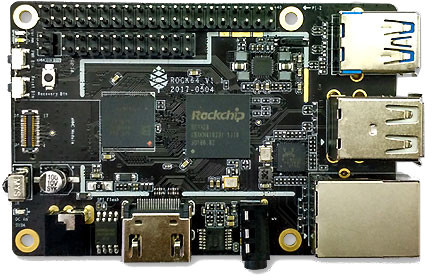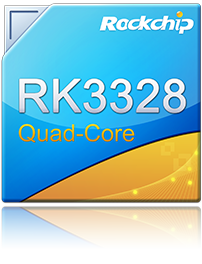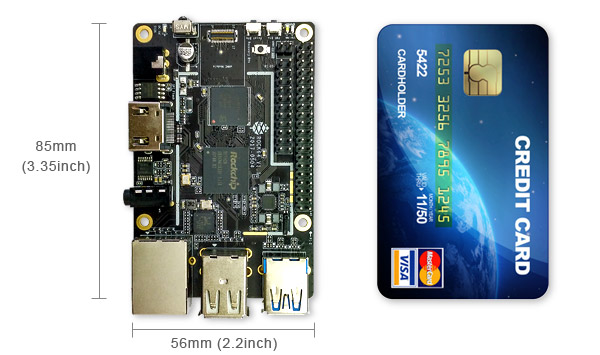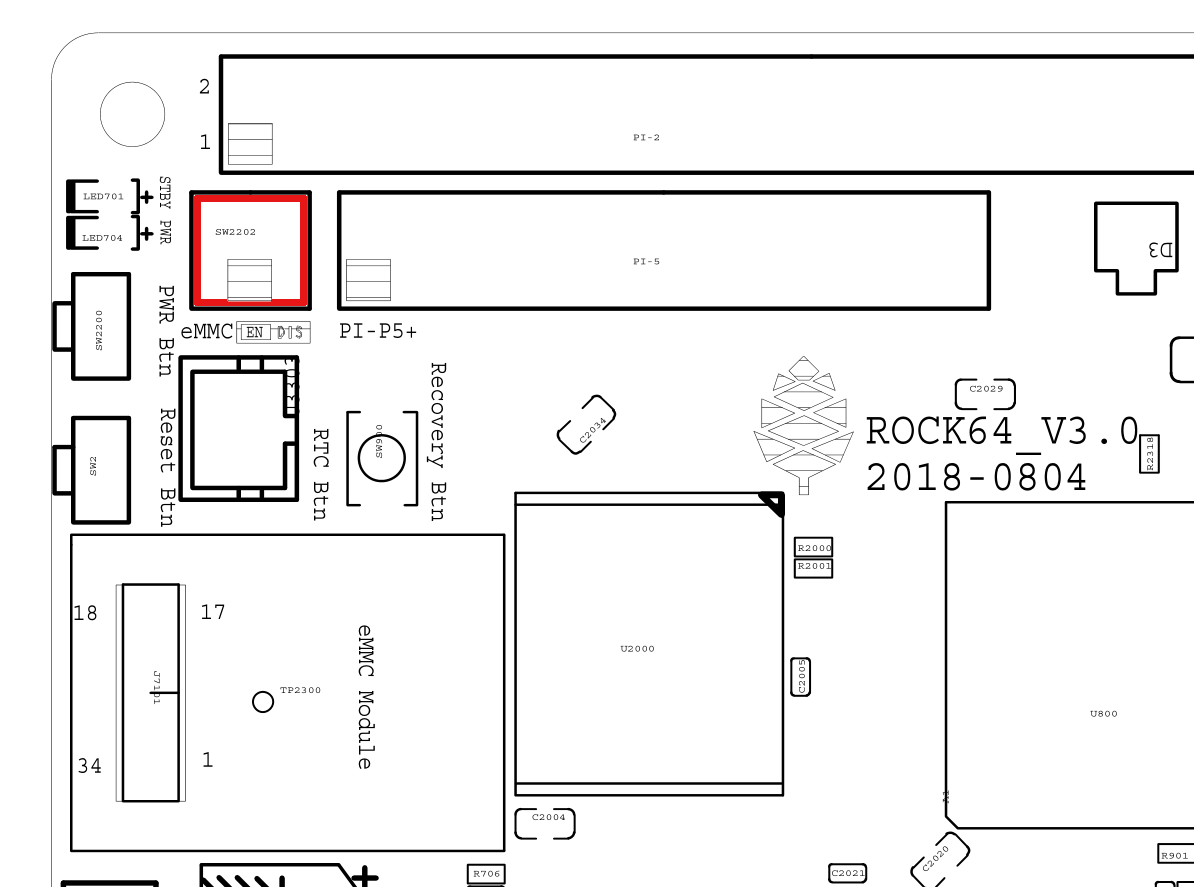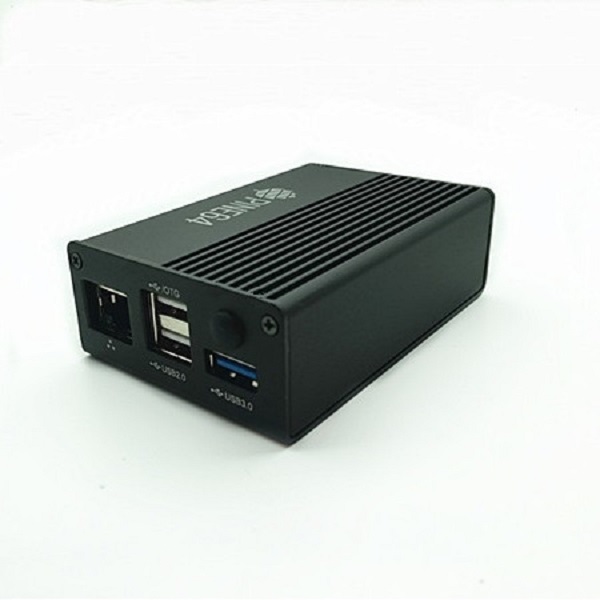Difference between revisions of "ROCK64"
(→Information, Schematics and Certifications: Small cleanups and improvements) |
|||
| (24 intermediate revisions by 7 users not shown) | |||
| Line 1: | Line 1: | ||
[[File: | [[File:Rock64.jpg|400px|thumb|right|The ROCK64]] | ||
The '''ROCK64''' is a credit-card size 4K60P HDR Media Board Computer powered by Rockchip RK3328 Quad-Core ARM Cortex A53 64-Bit Processor and supports up to 4GB 1866MHz LPDDR3 memory. It provides an eMMC module socket, MicroSD Card slot, Pi-2 Bus, Pi-P5+ Bus, USB 3.0, and many other peripheral interfaces for makers to integrate with sensors and other devices. | The '''ROCK64''' is a credit-card size 4K60P HDR Media Board Computer powered by Rockchip RK3328 Quad-Core ARM Cortex A53 64-Bit Processor and supports up to 4GB 1866MHz LPDDR3 memory. It provides an eMMC module socket, MicroSD Card slot, Pi-2 Bus, Pi-P5+ Bus, USB 3.0, and many other peripheral interfaces for makers to integrate with sensors and other devices. | ||
| Line 5: | Line 5: | ||
It supports many different open source operating systems, such as Android, Debian, and Yocto. | It supports many different open source operating systems, such as Android, Debian, and Yocto. | ||
== | == Software releases == | ||
Under [[ROCK64 Software Releases]] you will find a complete list of currently supported | Under [[ROCK64 Software Releases]] you will find a complete list of currently supported operating system images, which work with the ROCK64, as well as other related software. | ||
OS build Installation Guide and tools: | |||
* [https://files.pine64.org/doc/rock64/guide/ROCK64_Installing_Android_To_eMMC.pdf Guide to install stock Android build to eMMC module] | |||
* [ | * [https://files.pine64.org/doc/rock64/tools/SD_Firmware_Tool._v1.46.zip Tools to burn Android build into a bootable microSD card] | ||
* [https://files.pine64.org/doc/rock64/tools/AndroidTool_Release_v2.38.zip Tools that allows developer flash image into eMMC's Loader/Parameter/Misc/Kernal/Boot/Recovery/System/Backup partition] | |||
* [https://files.pine64.org/doc/rock64/tools/DriverAssitant_v4.5.zip Windows ADB driver package] | |||
* [[ROCK64 MAC Address]] | |||
* [ | |||
* [https:// | |||
* [https:// | |||
* [ | |||
{| class="wikitable sortable" | {| class="wikitable sortable" | ||
| Line 101: | Line 48: | ||
|} | |} | ||
== Upstreaming Status == | |||
{{Warning|The data presented in this section requires updating.}} | |||
{| class="wikitable plainrowheaders" border="1" | {| class="wikitable plainrowheaders" border="1" | ||
| Line 134: | Line 82: | ||
| <code>rk805_pwrkey</code> | | <code>rk805_pwrkey</code> | ||
| If your PWR switch does nothing unless held, this may need to be loaded manually with <code>modprobe</code> or by putting it in <code>/etc/modules-load.d/</code> | | If your PWR switch does nothing unless held, this may need to be loaded manually with <code>modprobe</code> or by putting it in <code>/etc/modules-load.d/</code> | ||
|- | |||
! scope="row" | Analog Video Output | |||
| colspan="2" style="background:#F99; text-align:center;"|Needs porting | |||
| <code>rockchip_drm_tve</code> | |||
| Definitely needs some cleanup before it'd be ready for mainline, and needs some dt bindings written. | |||
|} | |} | ||
| Line 231: | Line 184: | ||
== Board Features == | == Board Features == | ||
[[File:ROCK64_sideimg.jpg|400px|thumb|right|The ROCK64 and a size comparison]] | |||
=== Video === | === Video === | ||
* Digital Video output up to 4K@60Hz | * Digital Video output up to 4K@60Hz | ||
| Line 251: | Line 206: | ||
=== Storage === | === Storage === | ||
[[File:Rock64-emmc-disable-jumper.png|250px|thumb|right|Position of the two-pin header for disabling the optionally installed eMMC module (highlighted in red)]] | |||
* microSD - bootable, supports SDHC and SDXC and storage up to 256GB | * microSD - bootable, supports SDHC and SDXC and storage up to 256GB | ||
* eMMC - bootable (optional eMMC Module) | * eMMC - bootable (optional eMMC Module) | ||
| Line 256: | Line 213: | ||
* 1 USB3.0 Dedicated Host port | * 1 USB3.0 Dedicated Host port | ||
* 2 USB2.0 Dedicated Host port (top one is USB-OTG) | * 2 USB2.0 Dedicated Host port (top one is USB-OTG) | ||
Optionally installed eMMC module can be disabled by placing a jumper onto the two pins on the separate two-pin header, located near one of the mounting holes and two side-mounted buttons. See the picture in this section, in which this two-pin header is highlighted in red. | |||
=== Expansion Ports === | === Expansion Ports === | ||
| Line 263: | Line 222: | ||
* 2x11 pins "Pi P5+" GPIO Header (with 2nd 10/100Mbps Ethernet pins) | * 2x11 pins "Pi P5+" GPIO Header (with 2nd 10/100Mbps Ethernet pins) | ||
== | == Information, Schematics and Certifications == | ||
Board dimensions: 85 x 56 x 18.8 mm, see the [https://files.pine64.org/doc/rock64/rock64%20board%20dimension.pdf ROCK64 board dimension drawing] | |||
Power input: 3 A at 5 V DC, using 3.5 mm OD / 1.35 mm ID type H barrel connector (also known as DC 35135, 2 A at 5 V will work if there is no heavy load on the USB 3.0 port) | |||
ROCK64 ver 3.0 SBC related info: | |||
* [https://files.pine64.org/doc/rock64/Rock64%20Ver%203%20change%20notice.pdf ROCK64 SBC v3.0 Change Notice] | |||
* [https://files.pine64.org/doc/rock64/ROCK64_Schematic_v3.0_20181105.pdf ROCK64 Schematic v3.0 (Production Release)] | |||
* [https://files.pine64.org/doc/rock64/ROCK64_comp_ref_top_v3.0_20181105.pdf ROCK64 Component Reference location v3.0 (top layer)] | |||
* [https://files.pine64.org/doc/rock64/ROCK64_comp_ref_bottom_v3.0_20181105.pdf ROCK64 Component Reference location v3.0 (bottom layer)] | |||
* [https://files.pine64.org/doc/rock64/ROCK64_V3_Pi-2_and_Pi-P5+_Bus.pdf ROCK64 SBC v3.0 Pi-2 and Pi-P5+ Bus GPIO Assignment] | |||
* [https://files.pine64.org/doc/rock64/R64V3%20RTC%20Batt%20connector.png ROCK64 Rev3 SBC RTC Battery Connector polarity] | * [https://files.pine64.org/doc/rock64/R64V3%20RTC%20Batt%20connector.png ROCK64 Rev3 SBC RTC Battery Connector polarity] | ||
ROCK64 ver 2.0 SBC related info: | |||
* [https://files.pine64.org/doc/rock64/ROCK64_Schematic_v2.0_20171019.pdf ROCK64 Schematic v2.0 (Production Release)] | |||
* [https://files.pine64.org/doc/rock64/ROCK64_Pi-2%20_and_Pi_P5+_Bus.pdf ROCK64 SBC v2.0 Pi-2 and Pi-P5+ Bus GPIO Assignment] | |||
* [https://github.com/Leapo/Rock64-R64.GPIO Github on ROCK64 GPIO library, thanks to Leapo] | * [https://github.com/Leapo/Rock64-R64.GPIO Github on ROCK64 GPIO library, thanks to Leapo] | ||
* [http://synfare.com/599N105E/hwdocs/rock64/index.html Good documentation about ROCK64 GPIO pins article] | * [http://synfare.com/599N105E/hwdocs/rock64/index.html Good documentation about ROCK64 GPIO pins article] | ||
* [https://files.pine64.org/doc/rock64/ROCK64_ES9023_Audio_100Mbps_Ethernet_Board.pdf ROCK64 Audio DAC with 10/100Mbps Ethernet POT Board Schematic] | * [https://files.pine64.org/doc/rock64/ROCK64_ES9023_Audio_100Mbps_Ethernet_Board.pdf ROCK64 Audio DAC with 10/100Mbps Ethernet POT Board Schematic] | ||
ROCK64 3D autodesk drawing (from ''TeaPack''): | |||
* [https://myhub.autodesk360.com/ue2b2f72e/g/shares/SH7f1edQT22b515c761e818b9e1b31b54545?viewState=NoIgbgDAdAjCA0IAsSDMAzAnAQwCaoFoYBjAdhgICNTVcCA2S9AJgIFMJTsAOGTU3LmLYQAXSA ROCK64 board 2D drawing @courtesy of TeaPack] | |||
* [https://myhub.autodesk360.com/ue2b2f72e/g/shares/SH7f1edQT22b515c761e6078b748ecd478e1?viewState=NoIgbgDAdAjCA0IDeAdEAXAngBwKZoC40ARXAZwEsBzAOzXjQEMyzd1C0AmAEwGYZOAI0G4AtAA4ArABZeo6eIiNRggJwxuomAHYAxoOm6YMaQDZOvNAF8QAXSA ROCK64 board 3D drawing @courtesy of TeaPack] | |||
* [https://myhub.autodesk360.com/ue2b2f72e/g/shares/SH7f1edQT22b515c761e45a87155aecc813f?viewState=NoIgbgDAdAjCA0IDeAdEAXAngBwKZoC40ARXAZwEsBzAOzXjQEMyzd1C0BWAYwgGYYAEyEBaQQDYARoJEAWfjMmzckkQCYAHCs5LZAMxi41aAL4gAukA ROCK64 Audio DAC with 10/100Mbps Ethernet POT board 3D drawing @courtesy of TeaPack] | |||
* [https://myhub.autodesk360.com/ue2b2f72e/g/shares/SH7f1edQT22b515c761ee09b497ae3f2f72e?viewState=NoIgbgDAdAjCA0IBmSYEMAcBmAbBgtACwBGhMRATMeQKYYYX5ICcAJhjYWjDBGgKwgAukA ROCK64 board with Audio DAC POT board 3D drawing @courtesy of TeaPack] | |||
Certifications: | |||
* [https://files.pine64.org/doc/cert/ROCK64%20FCC%20certification%20VOC20171129.pdf ROCK64 FCC Certificate] | |||
* [https://files.pine64.org/doc/cert/ROCK64%20CE%20certification%20VOC20171129.pdf ROCK64 CE Certificate] | |||
* [https://files.pine64.org/doc/cert/ROCK64%20ROHS%20certification%20VOC20170927.pdf ROCK64 RoHS Certificate] | |||
== Datasheets for Components and Peripherals == | == Datasheets for Components and Peripherals == | ||
Rockchip RK3328 SoC information: | |||
* [https://www.rock-chips.com/a/en/products/RK33_Series/2017/0118/829.html Rockchip RK3328 SoC Brief] | |||
* [https://rockchip.fr/RK3328%20datasheet%20V1.2.pdf Rockchip RK3328 Datasheet V1.2] | |||
* [https://opensource.rock-chips.com/images/9/97/Rockchip_RK3328TRM_V1.1-Part1-20170321.pdf Rockchip RK3328 Technical Reference Manual part 1] | |||
* [https://files.pine64.org/doc/rock64/Rockchip_RK805_Datasheet_V1.1%C2%A020160921.pdf Rockchip RK805 Datasheet V1.1] | |||
LPDDR3 (178 Balls) SDRAM: | |||
* [https://files.pine64.org/doc/rock64/H9CCNNNCLTMLAR(Rev1.2).pdf Hynix LPDDR3 Datasheet V1.2] | |||
* [https://files.pine64.org/doc/rock64/K4E8E324EB-EGCF000_DRAM_178F_11x11.5_Ver.1.00.00.pdf Samsung LPDDR3 Datasheet V1.00.00] | |||
* [https://files.pine64.org/doc/rock64/SPECTEK_178B_32GB_V91M_MOBILE_LPDDR3.pdf Spectek LPDDR3 Datasheet] | |||
eMMC information: | |||
* [https://files.pine64.org/doc/rock64/PINE64_eMMC_Module_20170719.pdf PINE64 eMMC module schematic] | |||
* [https://files.pine64.org/doc/rock64/usb%20emmc%20module%20adapter%20v2.pdf PINE64 USB adapter for eMMC module V2 schematic] | |||
* [https://files.pine64.org/doc/rock64/USB%20adapter%20for%20eMMC%20module%20PCB.tar PINE64 USB adapter for eMMC module PCB in JPEG] | |||
* [https://files.pine64.org/doc/datasheet/pine64/E-00517%20FORESEE_eMMC_NCEMAM8B-16G%20SPEC.pdf 16GB Foresee eMMC Datasheet] | |||
* [https://files.pine64.org/doc/datasheet/pine64/SDINADF4-16-128GB-H%20data%20sheet%20v1.13.pdf 32Gb/64GB/128GB SanDisk eMMC Datasheet] | |||
SPI NOR Flash information: | |||
* [https://files.pine64.org/doc/datasheet/pine64/w25q128jv%20spi%20revc%2011162016.pdf WinBond 128Mb SPI Flash Datasheet] | |||
* [https://files.pine64.org/doc/datasheet/pine64/GD25Q128C-Rev2.5.pdf GigaDevice 128Mb SPI Flash Datasheet] | |||
Ethernet related info: | |||
* [https://files.pine64.org/doc/datasheet/rock64/RTL8211F-CG-Realtek.pdf Realtek RTL8211F 10/100/1000M Ethernet Transceiver Datasheet] | |||
* [https://files.pine64.org/doc/rock64/DGKYD111B096GWA1D.pdf 10/100Mbps MegJack on Audio DAC POT board Datasheet] | |||
Peripheral related info: | |||
* [https://files.pine64.org/doc/rock64/PDS-16002%20JMS578%20Datasheet%20(Rev.%201.01).pdf JMicron JMS578 to SATA Datasheet] | |||
Enclosure information: | |||
* [https://files.pine64.org/doc/datasheet/case/ROCK64%20Aluminum%20Waterproof%20Die%20Cast%20Casing.pdf Outdoor Aluminum Cast Dust-proof IP67 Enclosure Drawing] | |||
Remote control button mapping: | |||
* [https://files.pine64.org/doc/Pine%20A64%20Schematic/remote-wit-logo.jpg Official Remote Control for the PINE A64 Button Mapping] | |||
== Enclosures == | == Enclosures == | ||
| Line 327: | Line 297: | ||
* [["Model B" Acrylic Open Enclosure]], [https://pine64.com/product/model-b-acrylic-open-enclosure/ Store] | * [["Model B" Acrylic Open Enclosure]], [https://pine64.com/product/model-b-acrylic-open-enclosure/ Store] | ||
* | * "Model B" Aluminum Waterproof Enclosure, [https://pine64.com/product/model-b-aluminum-waterproof-enclosure/ Store] | ||
* [[ROCK64 Premium Aluminum Casing]], [https://pine64.com/product/model-b-premium-aluminum-casing/?v=0446c16e2e66 Store] | * [[ROCK64 Premium Aluminum Casing]], [https://pine64.com/product/model-b-premium-aluminum-casing/?v=0446c16e2e66 Store] | ||
| Line 340: | Line 310: | ||
=== Power button doesn't do anything on a short press (Linux) === | === Power button doesn't do anything on a short press (Linux) === | ||
Make sure the <code>rk805_pwrkey</code> module is loaded, e.g. with <code>lsmod | grep rk805_pwrkey</code>. If it doesn't show up, do a <code>modprobe rk805_pwrkey</code> as root. To make this persistent, create a <code>99-rk805_pwrkey.conf</code> in <code>/etc/modules-load.d/</code> with the content <code>rk805_pwrkey</code> | Make sure the <code>rk805_pwrkey</code> module is loaded, e.g. with <code>lsmod | grep rk805_pwrkey</code>. The module auto loading of <code>rk805_pwrkey</code> was fixed in the following upstream kernels: v6.0/v5.15.66/v5.10.142/v5.4.213/v4.19.258/v4.14.293 so there should be no requirement for fixes with those kernels or newer. If it doesn't show up, do a <code>modprobe rk805_pwrkey</code> as root. To make this persistent, create a <code>99-rk805_pwrkey.conf</code> in <code>/etc/modules-load.d/</code> with the content <code>rk805_pwrkey</code> | ||
If it still doesn't work, make sure your init system is actually listening to the button press. With systemd, check <code>/etc/systemd/logind.conf</code> and make sure it's either all commented out (uses defaults) or contains something like <code>HandlePowerKey=poweroff</code>. You can change the short press action by setting <code>HandlePowerKey</code> to one of "ignore", "poweroff", "reboot", "halt", "kexec", "suspend", "hibernate", "hybrid-sleep", "suspend-then-hibernate", or "lock". | If it still doesn't work, make sure your init system is actually listening to the button press. With systemd, check <code>/etc/systemd/logind.conf</code> and make sure it's either all commented out (uses defaults) or contains something like <code>HandlePowerKey=poweroff</code>. You can change the short press action by setting <code>HandlePowerKey</code> to one of "ignore", "poweroff", "reboot", "halt", "kexec", "suspend", "hibernate", "hybrid-sleep", "suspend-then-hibernate", or "lock". | ||
=== Video output is glitchy during activity === | |||
If your video output glitches out while there is memory bandwidth pressure, the likely reason is that the video output (VOP) quality-of-service (QoS) registers aren't set to high priority mode. | |||
[[User:CounterPillow]] submitted [https://overviewer.org/~pillow/up/c5179dcb67/0001-rockchip-rk3328-Set-VOP-QoS-to-high-priority.patch a patch] to u-boot to fix this, but someone still needs to write a kernel patch to save/restore the QoS registers from the power domain driver. | |||
== Other Resources == | == Other Resources == | ||
| Line 352: | Line 328: | ||
* [https://github.com/JamesLinEngineer/RKMC Rockchip Android RKMC (Forked from Kodi 16.1)] | * [https://github.com/JamesLinEngineer/RKMC Rockchip Android RKMC (Forked from Kodi 16.1)] | ||
* [https://opensource.rock-chips.com/ Rockchip Open Source Wiki] | * [https://opensource.rock-chips.com/ Rockchip Open Source Wiki] | ||
* [https://www.armbian.com/rock64 Armbian's ROCK64 Page] | * [https://www.armbian.com/rock64 Armbian's ROCK64 Page] | ||
[[Category: | [[Category:ROCK64]] [[Category:Rockchip RK3328]] | ||
Revision as of 13:19, 17 September 2024
The ROCK64 is a credit-card size 4K60P HDR Media Board Computer powered by Rockchip RK3328 Quad-Core ARM Cortex A53 64-Bit Processor and supports up to 4GB 1866MHz LPDDR3 memory. It provides an eMMC module socket, MicroSD Card slot, Pi-2 Bus, Pi-P5+ Bus, USB 3.0, and many other peripheral interfaces for makers to integrate with sensors and other devices.
It supports many different open source operating systems, such as Android, Debian, and Yocto.
Software releases
Under ROCK64 Software Releases you will find a complete list of currently supported operating system images, which work with the ROCK64, as well as other related software.
OS build Installation Guide and tools:
- Guide to install stock Android build to eMMC module
- Tools to burn Android build into a bootable microSD card
- Tools that allows developer flash image into eMMC's Loader/Parameter/Misc/Kernal/Boot/Recovery/System/Backup partition
- Windows ADB driver package
- ROCK64 MAC Address
| Requirement | GNU/Linux | Android/Linux | Kodi/Linux |
|---|---|---|---|
| 2160p 30Hz 8bit h264/h265/vp8 | partial? 1 | yes | yes |
| UI using GPU | no | yes | yes |
| Youtube | no | yes | no |
| vp9 / mpeg4 / mpeg2 / 10bit HDR / YCbCr | no | yes? | yes |
Upstreaming Status
| Function | Status | Component | Notes | |
|---|---|---|---|---|
| Video Output | Linux Mainline | rockchipdrm
|
With mpv, you'll need to specify something like mpv --gpu-context=drm --drm-connector=1.HDMI-A-1 to get it to play back on a VT
| |
| 3D Acceleration | Linux Mainline | Upstream Mesa | lima
|
Very recent version recommended for the best experience. Has weird glitches on HDMI output in weston. |
| Video Decode | Linux Staging | Broken/Not in ffmpeg | hantro_vpu and rockchip_vdec, using v4l2-requests
|
Soon to be moved out of staging, ffmpeg patch set seemingly abandoned, does not work on newer kernels. Git branch with commits |
| Audio | Linux Mainline | snd_soc_rockchip_*
| ||
| Power Button | Linux Mainline | rk805_pwrkey
|
If your PWR switch does nothing unless held, this may need to be loaded manually with modprobe or by putting it in /etc/modules-load.d/
| |
| Analog Video Output | Needs porting | rockchip_drm_tve
|
Definitely needs some cleanup before it'd be ready for mainline, and needs some dt bindings written. | |
SoC and Memory Specification
- Based on Rockchip RK3328
CPU Architecture
- Quad-core Cortex-A53 up to 1.5GHz CPU
- Full implementation of the ARM architecture v8-A instruction set
- ARM Neon Advanced SIMD (single instruction, multiple data) support for accelerated media and signal processing computation
- ARMv8 Cryptography Extensions
- In-order pipeline with symmetric dual-issue of most instructions
- Unified system L2 cache
- Includes VFP v3 hardware to support single and double-precision operations
- Integrated 32KB L1 instruction cache, 32KB 4-way set associative L1 data cache
- TrustZone technology support
- Full CoreSight debug solution
- One separate power domain for CPU core system to support internal power switch, and to externally turn on/off based on different application scenario
- PD_A53: Cortex-A53 + Neon + FPU + L1 I/D Cache of core 2/3
- One isolated voltage domain to support DVFS
Frequencies & Voltages
| Frequency | Voltage |
|---|---|
| 408 MHz | 0.950 V |
| 600 MHz | 0.950 V |
| 816 MHz | 1.000 V |
| 1008 MHz | 1.100 V |
| 1200 MHz | 1.225 V |
| 1296 MHz | 1.300 V |
Power Draw
These numbers for power draw have been measured through an USB power monitor (FNB38) while running the stress utility, whereby "cpu" stands for stress --cpu 4 and "vm" stands for stress --vm 4. The former spins on the CPU, the latter stresses the memory. Real workloads are usually a mix of both. The tests were ran through ssh, with nothing besides power and ethernet plugged into the ROCK64
Please keep in mind that under real world usage, many other factors come into play. Having a display connected, running a graphical session, I/O and most importantly the connected USB peripherals can add a lot.
Helpful refresher on the formula for power (W) on DC: power = current × voltage, because the power factor is 1. The ROCK64 runs on 5V, so use that to calculate current if you need to.
| Frequency | Power cpu | Power vm |
|---|---|---|
| 1296 MHz | 2.64 W | 2.95 W |
| 1200 MHz | 2.32 W | 2.69 W |
| 1008 MHz | 1.90 W | 2.31 W |
| 816 MHz | 1.62 W | 2.05 W |
| 600 MHz | 1.45 W | 1.85 W |
| 408 MHz | 1.33 W | 1.72 W |
| Idle (no load) | 1.10 W | |
It appears a good upper bound for a headless setup is in the neighbourhood of 3 W, or the energy contained in 0.025 bananas per hour.
GPU Architecture
- ARM Mali-450MP2 Dual-core GPU
- OpenGL ES 1.1 and 2.0, OpenVG1.1
System Memory
- LPDDR3 RAM Memory Variants: 1GB, 2GB and 4GB.
Board Features
Video
- Digital Video output up to 4K@60Hz
- 4K HDR @ 60fps
- H.264/AVC Base/Main/High/High10 profile @ level 5.1; up to 4Kx2K @ 60fps
- H.265/HEVC Main/Main10 profile @ level 5.1 High-tier; up to 4Kx2K @ 60fps
- VP9, up to 4Kx2K @ 60fps
- MPEG-1, ISO/IEC 11172-2, up to 1080P @ 60fps
- MPEG-2, ISO/IEC 13818-2, SP@ML, MP@HL, up to 1080P @ 60fps
- MPEG-4, ISO/IEC 14496-2, SP@L0-3, ASP@L0-5, up to 1080P @ 60fps
- VC-1, SP@ML, MP@HL, AP@L0-3, up to 1080P @ 60fps
- MVC is supported based on H.264 or H.265, up to 1080P @ 60fps
Audio
- 3.5mm A/V Jack (Composite Video Output and RCA Stereo support using conversion cable)
Network
- 10/100/1000Mbps Ethernet
- WiFi 802.11 b/g/n with Bluetooth 4.0 (optional USB dongle)
Storage
- microSD - bootable, supports SDHC and SDXC and storage up to 256GB
- eMMC - bootable (optional eMMC Module)
- 128Mbit (16MB) on-board SPI flash memory (empty by default) - bootable? Usually accessible as a Linux MTD device at
/dev/mtd0 - 1 USB3.0 Dedicated Host port
- 2 USB2.0 Dedicated Host port (top one is USB-OTG)
Optionally installed eMMC module can be disabled by placing a jumper onto the two pins on the separate two-pin header, located near one of the mounting holes and two side-mounted buttons. See the picture in this section, in which this two-pin header is highlighted in red.
Expansion Ports
All GPIO pins, including UART, operate at 3.3V. (See VCCIO5 in the schematics.)
- 2x20 pins "Pi2" GPIO Header
- 2x11 pins "Pi P5+" GPIO Header (with 2nd 10/100Mbps Ethernet pins)
Information, Schematics and Certifications
Board dimensions: 85 x 56 x 18.8 mm, see the ROCK64 board dimension drawing
Power input: 3 A at 5 V DC, using 3.5 mm OD / 1.35 mm ID type H barrel connector (also known as DC 35135, 2 A at 5 V will work if there is no heavy load on the USB 3.0 port)
ROCK64 ver 3.0 SBC related info:
- ROCK64 SBC v3.0 Change Notice
- ROCK64 Schematic v3.0 (Production Release)
- ROCK64 Component Reference location v3.0 (top layer)
- ROCK64 Component Reference location v3.0 (bottom layer)
- ROCK64 SBC v3.0 Pi-2 and Pi-P5+ Bus GPIO Assignment
- ROCK64 Rev3 SBC RTC Battery Connector polarity
ROCK64 ver 2.0 SBC related info:
- ROCK64 Schematic v2.0 (Production Release)
- ROCK64 SBC v2.0 Pi-2 and Pi-P5+ Bus GPIO Assignment
- Github on ROCK64 GPIO library, thanks to Leapo
- Good documentation about ROCK64 GPIO pins article
- ROCK64 Audio DAC with 10/100Mbps Ethernet POT Board Schematic
ROCK64 3D autodesk drawing (from TeaPack):
- ROCK64 board 2D drawing @courtesy of TeaPack
- ROCK64 board 3D drawing @courtesy of TeaPack
- ROCK64 Audio DAC with 10/100Mbps Ethernet POT board 3D drawing @courtesy of TeaPack
- ROCK64 board with Audio DAC POT board 3D drawing @courtesy of TeaPack
Certifications:
Datasheets for Components and Peripherals
Rockchip RK3328 SoC information:
- Rockchip RK3328 SoC Brief
- Rockchip RK3328 Datasheet V1.2
- Rockchip RK3328 Technical Reference Manual part 1
- Rockchip RK805 Datasheet V1.1
LPDDR3 (178 Balls) SDRAM:
eMMC information:
- PINE64 eMMC module schematic
- PINE64 USB adapter for eMMC module V2 schematic
- PINE64 USB adapter for eMMC module PCB in JPEG
- 16GB Foresee eMMC Datasheet
- 32Gb/64GB/128GB SanDisk eMMC Datasheet
SPI NOR Flash information:
Ethernet related info:
- Realtek RTL8211F 10/100/1000M Ethernet Transceiver Datasheet
- 10/100Mbps MegJack on Audio DAC POT board Datasheet
Peripheral related info:
Enclosure information:
Remote control button mapping:
Enclosures
The ROCK64 fits in three officially sold cases.
- "Model B" Acrylic Open Enclosure, Store
- "Model B" Aluminum Waterproof Enclosure, Store
- ROCK64 Premium Aluminum Casing, Store
Troubleshooting
HDMI output disconnects as soon as it connects
Some older monitors seemingly can get into a weird state wherein the ROCK64 is unable to establish a proper connection with them. User:CounterPillow has seen this happen on an iiyama ProLite G2773HS connected over HDMI, and an Acer P225HQL connected over an HDMI to DVI adapter. The symptoms usually are that you see the monitor briefly turn on its backlight without displaying a picture, but then immediately either shutting off again or showing a "No Signal" message.
The solution is to completely power down your ROCK64, also removing its power source. Then plug in the monitor, and start up the ROCK64 afterwards. You should now be getting a picture again.
Power button doesn't do anything on a short press (Linux)
Make sure the rk805_pwrkey module is loaded, e.g. with lsmod | grep rk805_pwrkey. The module auto loading of rk805_pwrkey was fixed in the following upstream kernels: v6.0/v5.15.66/v5.10.142/v5.4.213/v4.19.258/v4.14.293 so there should be no requirement for fixes with those kernels or newer. If it doesn't show up, do a modprobe rk805_pwrkey as root. To make this persistent, create a 99-rk805_pwrkey.conf in /etc/modules-load.d/ with the content rk805_pwrkey
If it still doesn't work, make sure your init system is actually listening to the button press. With systemd, check /etc/systemd/logind.conf and make sure it's either all commented out (uses defaults) or contains something like HandlePowerKey=poweroff. You can change the short press action by setting HandlePowerKey to one of "ignore", "poweroff", "reboot", "halt", "kexec", "suspend", "hibernate", "hybrid-sleep", "suspend-then-hibernate", or "lock".
Video output is glitchy during activity
If your video output glitches out while there is memory bandwidth pressure, the likely reason is that the video output (VOP) quality-of-service (QoS) registers aren't set to high priority mode.
User:CounterPillow submitted a patch to u-boot to fix this, but someone still needs to write a kernel patch to save/restore the QoS registers from the power domain driver.
Other Resources
- ROCK64 Forum
- IRC Server: irc.pine64.org Channel: ROCK64
- ROCK64 Linux GitHub Repo
- ROCK64 ayufan GitHub Repo
- Rockchip Linux GitHub Repo
- Rockchip Android RKMC (Forked from Kodi 16.1)
- Rockchip Open Source Wiki
- Armbian's ROCK64 Page
